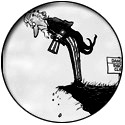On every radio station, in every newspaper, and in every history class you are guaranteed to hear the words “fiscal cliff.” But what does that really mean? Who came up with that name? And does it really affect any of us?
Citizens and politicians alike use the term “fiscal cliff” to refer to the beginning of 2013, when the terms of the Budget Control Act of 2011 were scheduled to go into effect. Former President George W. Bush’s tax cuts were originally set to expire at the end of 2010, but President Barack Obama extended the cuts for another two years.
The debt ceiling is the total amount of money that the U.S. government is authorized to use to pay existing obligations such as Social Security, tax refunds, military salary, etc. The debt limit allows existing obligations to be financed that have already been established in Congress. In 2011 the Budget Control Act provided a debt ceiling increase between 2.1 trillion and 2.4 trillion. The Budget Control Act made is so that by the end of 2012 the borrowing authority from this law will expire. Dramatic spending cuts and tax increases would immediately take place. This threat is what is referred to as the fiscal cliff.
The majority of the tax cuts since 2001 expired Dec. 31, 2012, and government spending was dramatically reduced. Congress had been working to improve and balance the budget. They needed to come up with a solution by the New Year to avoid the negative effects of the Budget Control Act of 2011.
The cuts in government spending would ideally reduce the nation’s debt. Automatic spending cuts originally set to go into act on January 2 would reduce spending by $109 billion per year, according to the Council on Foreign Relations. The Congressional Budget Office predicted that the plan would lower the Federal Deficit Budget by $487 Billion, Gross Domestic Product by 0.5%, and unemployment would increase to 9.1%. Americans can expect to face the reverberations. According to the Tax Policy Center, “the looming fiscal cliff threatens to boost taxes by more than $500 billion in 2013 … Nearly 90 percent of Americans would pay more taxes.” Obama’s temporary 2% cut in payroll taxes will also expire.
Three hours before the January 1 deadline the House of Representatives voted to approve the Senate bill to avoid the fiscal cliff. The Senate bill passed two hours after the deadline and the House of Representatives passed 21 hours later. This bill extended the Bush-era tax cuts, and extended long-term unemployment benefits that would have otherwise expired. The bill includes an increase in the payroll tax by two percentage points to 6.2% for income up to $113,700, and a reversal of the Bush tax cuts for individuals making more than $400,000 and couples making over $450,000. The Congressional Budget Office estimates that the current plan will increase the deficit by $3.9 trillion in that time period while still raising taxes on 77.1% of U.S. households.
Although the agreement avoided potential economic turmoil, there are still some negative side effects. Since August 2011, lawmakers tried to find solutions to this upcoming issue, yet didn’t reach an agreement until the final hours. Also, the agreement only includes the revenue or tax side but postpones talk of spending cuts for another two months. If Congress is not able to come up with spending plan to meet the new budget then the spending cuts that were originally threatened with the fiscal cliff will continue to exist. Although the deal solved many issues, taxes are still going to rise as a result, which was originally a main concern and fear.
“It ended up being a waste. The congressmen set a date to force themselves to fix the budget. But they took the easy way out by extending the fiscal cliff even though that was not supposed to happen. It looked like they were trying to become bipartisan and work together but instead now they are waiting another two months to fix it,” senior Marisa Marshalka said.
For now, lawmakers have temporarily solved a potential financial crisis. However, it is important to be informed and understand what could economically happen in our nation within the upcoming months
